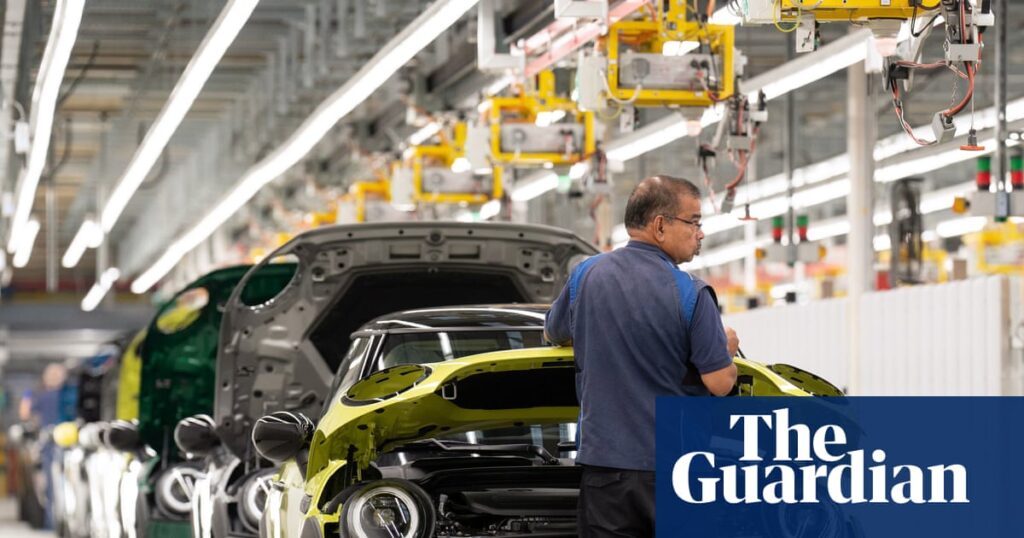Carmakers claimed that leaving electric car sales rules unchanged would threaten British jobs and cost them hundreds of millions of pounds, according to documents that show the private lobbying for a slower transition away from fossil fuels.
BMW, Jaguar Land Rover, Nissan and Toyota claimed that rules forcing them to sell more electric cars each year would harm investment in the UK, according to responses to proposed changes submitted to the government. The responses were obtained by Fast Charge, a newsletter covering electric cars, and shared with the Guardian.
JLR, the Land Rover maker, said leaving the rules unchanged would “materially damage UK producers’ ability to invest in vehicle lines”.
The last Conservative government said last year that automotive manufacturers must sell an increasing proportion of electric cars each year, or else face steep fines, under rules known as the zero emission vehicle (ZEV) mandate.
Electric car sales have increased rapidly, accounting for more than a fifth of the market in July, and every carmaker complied with targets last year. However, carmakers earlier overestimated the demand for battery vehicles, meaning they have been forced to cut prices to attract buyers.
Lower prices are good for consumers, but the industry has argued they are unsustainable. After intensive lobbying, the Labour government backed down in April, adding new “flexibilities” to rules that will allow carmakers to sell more petrol cars.
The consultation responses reveal the detailed arguments that carmakers made in private in favour of leniency, despite advice from the government’s official climate adviser that the changes could raise UK carbon emissions.
The German manufacturer BMW said the UK had become worse for manufacturing since Brexit, but added that the ZEV mandate was “much more radical and far-reaching” than the equivalent rules in the EU or California.
BMW, which makes Mini and Rolls-Royce cars in Britain, wrote: “The UK has already become a far more difficult place to produce vehicles now post-Brexit, and a further challenging market environment could ultimately damage competitiveness and have a detrimental effect on the 8,000 jobs – up to 50,000 with supply chain – we currently retain in the UK.”
Japan’s Toyota, which runs factories in Derbyshire and north Wales, said “penalties could amount to hundreds of millions of pounds for individual manufacturers, a level that could place employment and investment across the industry at risk.” The world’s biggest carmaker by volume has focused on hybrid cars, combining a smaller battery and a petrol engine, and has lobbied successfully for hybrid sales to be allowed until 2035 in the UK.
Its Japanese rival Nissan, whose sole European factory is in Sunderland, said carmakers needed more flexibilities or else face “critical levels” of costs that would divert money “away from battery EV research and development in the UK”.
JLR, which has the most British factories, complained that a rule that allowed carmakers to buy “credits” from rivals whose electric car sales were above target meant that British companies were subsidising rivals particularly in China, which dominates electric car production.
However, campaigners counter that the rules worked by forcing carmakers to go electric.
Ben Nelmes, the chief executive of New Automotive, a group advocating the switch to electric vehicles, said: “The car industry’s own consultation responses confirm that the ZEV mandate’s 2024 targets were met, proving the policy is a powerful driver of change.
“The focus should now shift to accelerating the transition, as this data shows the UK automotive industry is capable of delivering cheaper, cleaner transport.”
after newsletter promotion
Tom Riley, the author of the Fast Charge newsletter, said: “Carmakers love to wave the union jack when it suits them, but threatening UK jobs and investment to weaken climate policy is a cynical tactic.”
Mike Hawes, the chief executive of the Society of Motor Manufacturers and Traders (SMMT), a lobby group, said: “The automotive industry faces unprecedented challenges, not least the shift to EVs against a subdued economic backdrop and fierce global competition. The ZEV mandate intensifies the pressure with the timescale necessitating brands spend billions to drive demand to achieve compliance. UK manufacturers have consistently warned that this cost was unsustainable and would threaten further investment.
He said the government was right to change previous targets, which would have meant “decarbonisation at the cost of de-industrialisation”.
A BMW spokesperson said the company supported UK and global climate targets, but added: “We believe consumers will ultimately determine the pace of transition to ZEVs, as mandates do not create demand.”
A Nissan spokesperson said: “We welcome the government’s pragmatic approach to lower-than-anticipated EV take-up, including the introduction of consumer incentives designed to bring consumer demand closer to ZEV mandate requirements.”
JLR and Toyota declined to comment.
Quick Guide
Contact us about this story
Show
The best public interest journalism relies on first-hand accounts from people in the know.
If you have something to share on this subject you can contact us confidentially using the following methods.
Secure Messaging in the Guardian app
The Guardian app has a tool to send tips about stories. Messages are end to end encrypted and concealed within the routine activity that every Guardian mobile app performs. This prevents an observer from knowing that you are communicating with us at all, let alone what is being said.
If you don’t already have the Guardian app, download it (iOS/Android) and go to the menu. Select ‘Secure Messaging’.
SecureDrop, instant messengers, email, telephone and post
If you can safely use the tor network without being observed or monitored you can send messages and documents to the Guardian via our SecureDrop platform.
Finally, our guide at theguardian.com/tips lists several ways to contact us securely, and discusses the pros and cons of each.

